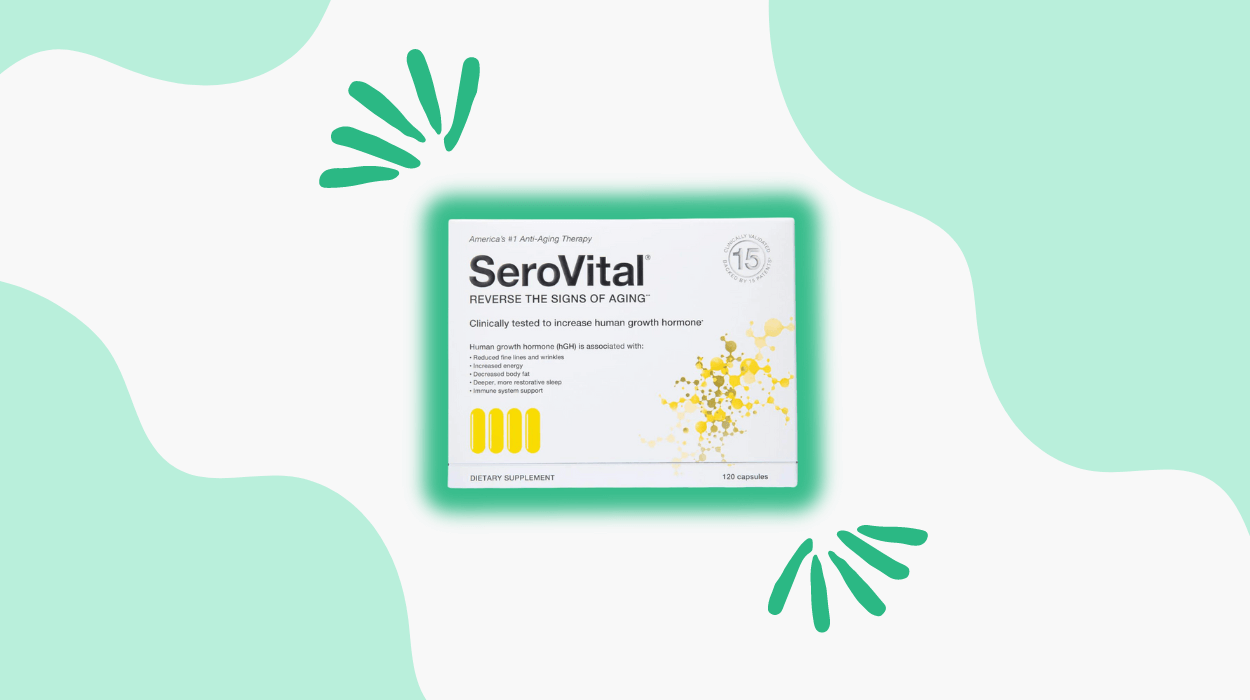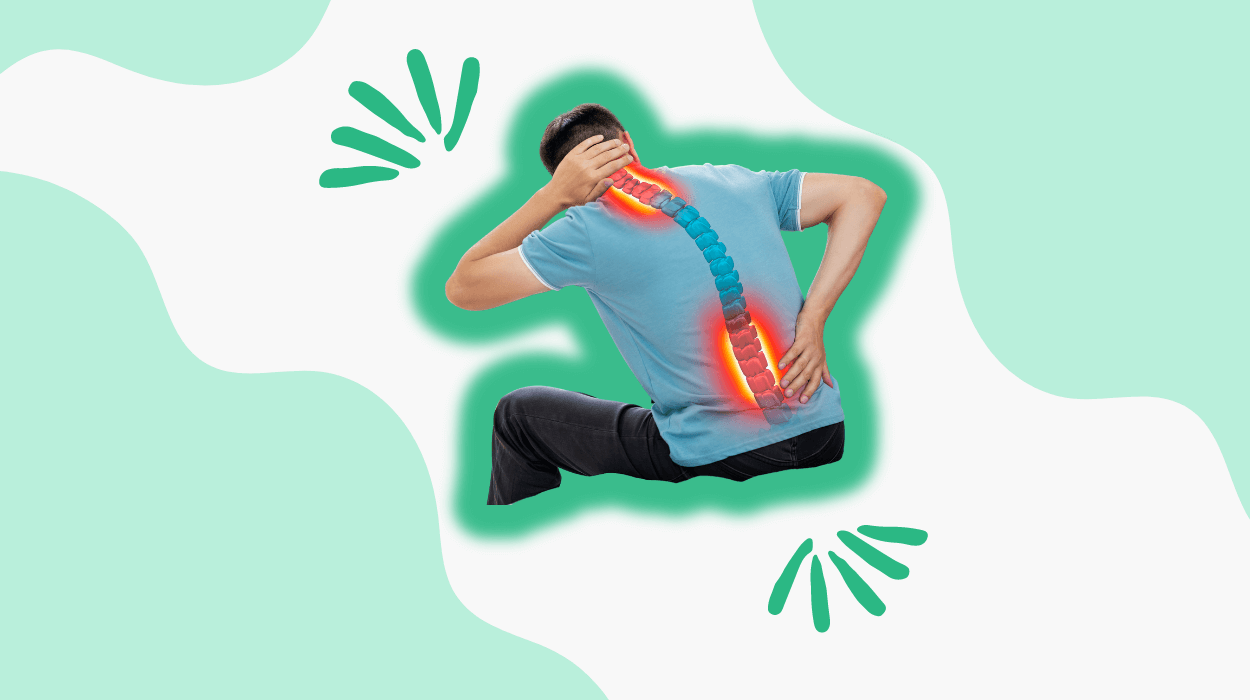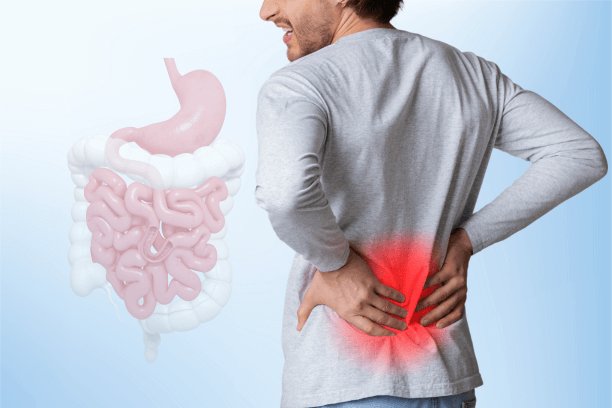

Back pain can disrupt your daily work by limiting your flexibility and motion. You can experience these issues due to movement issues in the spine or other reasons like gas, constipation, and vascular disease.
Gas might cause back pain when it gets trapped in the intestines. It could lead to cramping or bloating, which may further cause discomfort in the back.
Swallowing too much air while eating or drinking, using a straw, consuming carbonated beverages, or consuming food with artificial sweeteners might lead to excessive gas in the digestive system. Excessive use of alcohol could also contribute to gastric back pain.
This review explains the symptoms you may experience from excessive gas production in the stomach. Read further to know the causes, treatment, and home remedies to cure gastritis back pain.
Gastritis is represented by various symptoms that can influence your digestive health. These symptoms may include:

Gas released during digestion is a natural process that might contribute to back pain. When carbohydrates such as fiber, starch, and sugar get fermented by bacteria, it increases the gas level in the colon. However, any remaining gas is released from the digestive system, which might lead to bloating, pain, and tenderness in the abdomen. This bloating could radiate to the back, causing discomfort and pain.
Alcohol consumption may cause harm to the stomach lining, resulting in the development of stomach ulcers and contributing to gastric back pain. It could lead to the formation of ulcers that might cause discomfort and pain in the stomach and back.
Stomach ulcers could irritate the surrounding tissues and nerves, resulting in discomfort and pain in the back. Excessive alcohol could also contribute to indigestion, which might manifest as discomfort, bloating, and pain in the abdomen.
Back pain during pregnancy is common as the body experiences changes. The body tries to adjust to the growing pregnancy, the ligaments become weaker, and the additional weight could burden the lower back.
Hormonal changes, increased gas, and the strain on the lower back may result in back pain during pregnancy. However, not all back pain during pregnancy depends solely on gas. Posture changes, pelvic changes, weight alterations, and muscle or ligament weakness could cause back pain.
Injuries to the back, such as spinal cord injuries and herniated discs, can disrupt the normal functioning of the gastrointestinal system. It might interfere with the proper movement of the digestive system, causing gas to build up in the intestines and leading to bloating. Back injuries could affect the nerves that control the muscles in bowel movements, leading to difficulty passing stools and controlling bowel movements.
Stress impacts the gastrointestinal system, potentially leading to back pain due to ulcers. It might cause a decrease in blood circulation to the stomach, making it more vulnerable to a low-pH environment. The acidic environment may damage the stomach lining and lead to ulcers.
Stress-induced ulcers can result in various symptoms, including abdominal pain, bloating, nausea, and back pain.
Chronic health conditions like diabetes and food intolerance might impact the functioning of the digestive system, increasing the chance of trapped gas and resulting in back pain. These conditions might disrupt the normal digestive process, which can cause discomfort and radiate to the back.
| Chronic Health Conditions | Impact on the Digestive System |
|---|---|
|
Diabetes |
It could affect the nerves that control digestion, slowing digestion and increasing gas production. |
|
Intestinal Diseases |
Conditions such as Crohn’s illness and irritable bowel syndrome can cause inflammation and disrupt normal digestion. |
|
Food Intolerances |
Lactose or gluten intolerance can result in digestive symptoms, including gas and bloating |
Hormonal changes might impact the body’s functioning, including back pain. Changes in estrogen levels could lead to muscular and joint pain, including back pain. It may happen during different stages of the menstrual cycle, pregnancy, and menopause, which could cause or worsen back pain.
Raised levels of progesterone might cause relaxation of the ligaments and muscles, including those supporting the spine. It could lead to instability and increased stress on the back, resulting in pain and discomfort.
Swallowing too much air while eating or drinking could cause back pain due to gas. Eating or drinking rapidly could cause excessive air to be breathed into the body. The carbonation in drinks can release gas in the stomach, leading to increased bloating and pain.
You should stay mindful of your eating and drinking habits to minimize the amount of air you swallow. Eating slowly, avoiding using straws, and limiting carbonated beverages reduce the incidence of air swallowing and alleviate back pain associated with gas.
The excessive use of certain medications, such as NSAIDs and painkillers, can negatively impact the stomach’s pH level and lead to ulcers and back pain.
NSAIDs are used to lower inflammation and relieve pain by inhibiting the growth of certain enzymes that contribute to inflammation. However, these medications can also interfere with the stomach’s natural ability to protect itself from acid.
Various treatments are available to alleviate back pain and discomfort and promote healing.
Managing gastritis pain could be effectively supported by implementing various physiotherapy techniques.
| Physiotherapy Techniques | Description | Benefits |
|---|---|---|
| Breathing exercises | Deep diaphragmatic breathing techniques can help relax the abdominal muscles and promote blood flow to the stomach. | Improves circulation to the stomach, aiding in the healing process.- Reduces tension in the abdominal muscles, relieving pain and discomfort. |
| Stretching | Gentle stretching exercises could help alleviate muscle strain in the abdomen and back, improving flexibility and promoting relaxation. | Relieves muscle tightness and stiffness, reducing pain and discomfort.- Enhances flexibility and range of motion, promoting better digestion. |
| Low-impact practices | Low-impact activities such as cycling, swimming, or walking may help improve overall cardiovascular fitness and promote blood circulation. | – Increases blood flow to the stomach, enhancing the delivery of nutrients and oxygen for healing.- Promotes overall well-being and reduces stress levels, which can alleviate gastritis symptoms. |
These techniques can promote blood circulation, target the regeneration of the stomach lining, and improve the functioning of secretory glands, providing relief from discomfort and promoting smooth digestion.
To manage gastritis pain at home, you can perform various remedies that may help alleviate discomfort and bloating. Here are some home remedies that can provide relief:
Gas can cause back pain when trapped in the intestines, leading to cramping and bloating. However, intense pain across the abdomen indicates that the pain sensation in the back is due to gas.
Self-care options for relieving gas-related back pain include diet modifications, such as avoiding gas-producing foods and trying over-the-counter remedies like Beano for prevention and simethicone for removal. However, you must consult a doctor if back pain symptoms persist.
Yes. Consuming foods high in fiber, certain carbohydrates, or carbonated beverages could contribute to gas pain in the back. Talk to a healthcare professional to evaluate and address these factors.
Yes. There is a relation between urinary tract infections (UTIs) and back pain. UTIs can cause back pain if the infection is left untreated and reaches the kidney. However, it is better to consult a doctor to examine your UTI infection to prevent back pain.
Gas is a natural body process that could cause discomfort if not burped out. However, gas accumulated in the stomach may appear as back pain, and gas stuck in the abdomen could cause back pain in the lower back.
You could treat occasional or mild back pain with cold or heat therapies, limited bed rest, and increased physical activity. Walking more may also provide some relief from back pain caused by gas.
You can also take physiotherapy to strengthen your back health and alleviate discomfort. Physiotherapy may promote flexibility of your back by slowly diminishing the distress.
A few underlying factors, such as digestive issues, back injuries, and urinary tract infections, might also contribute to back pain. Thus, seeking immediate medical advice to diagnose and treat the underlying causes of back pain is essential.
Tyler Read earned an undergraduate academic degree from Sonoma State University, California and is a certified personal trainer (CPT) with NASM (National Academy of Sports Medicine). With over 16 years of experience, Tyler has trained clients both online and in-person.
He is passionate about helping others turn their love for fitness into a career. Tyler has worked with many local and commercial gyms before establishing his successful private personal training business, which he continues to operate.
